The Dead Boys were short-lived, recording just two albums before they broke up. But their first album, 1977’s Young, Loud and Snotty, was one of the great punk rock albums to come out of America. The band hailed from Cleveland, rising from the ashes of the legendary Rocket From The Tombs, but they made their mark in New York City as CBGB’s regulars.
Cheetah Chrome played guitar for both Rocket From The Tombs and the Dead Boys. He co-wrote the Dead Boys’ signature song “Sonic Reducer”, plus “Ain’t It Fun” off their second album We’ve Come For Your Children.
Cheetah Chrome and drummer Johnny Blitz recently reunited the Dead Boys to celebrate their debut album’s 40th anniversary. Original Dead Boys singer Stiv Bators died in 1990 after being hit by a car; Jake Hout is the new singer.
This interview was for a preview article for noozhawk.com for the 5/29/19 Dead Boys show at The Garage in Ventura, California. It was done by phone on 5/3/19. (Jeff Fasano photo)
Jeff Moehlis: I saw the Dead Boys in July 2017 at the Viper Room in Los Angeles, and really enjoyed it. But I’d like to hear from you – what can people look forward to at the upcoming show?
Cheetah Chrome: Oh, jeez, whatever Jake’s got in his devious little mind [laughs]. I don’t know, it depends on the spur of the moment. Somebody might get hurt, you never know [laughs]. It’s a very exciting life.
JM: I thought Jake was great when I saw the Dead Boys in LA.
CC: It was one of the first times I’d worked with him. I wasn’t sure what to expect.
JM: How did you connect up with him?
CC: He had the band The UNdead Boys before this, where I guess they got together one or two times a year to play Dead Boys songs dressed like zombies. My guitar player knew these guys, and people were telling me, “Have you heard this band the UNdead Boys? They’re really good…” I hadn’t seen them, and we were supposed to play at the Whisky about 6 months before the Viper Room shows, and we decided that we’d get him and the bass player. We needed a bass player, and wanted to save on flight tickets, so we got the bass player and the singer who drove down to LA [laughs]. I didn’t feel like singing. I never thought it was going to end up like this. With Jake, we ended up killing it. [Drummer Johnny] Blitz was going to be coming back into the fold anyway, and when he did we got the full line-up together finally.
JM: I want to ask you about the original singer for the Dead Boys, Stiv Bators, who sadly is no longer with us. How would you describe being in a band with Stiv?
CC: He was one of the best performers in the world that I ever worked with. He was just an amazing performer and an amazing person. He was my brother, you know? I waited a long time before I found somebody that could do it. With Jake, I finally realized that this is the guy. It’s worked out fine ever since. I very proud of my choice. You can’t replace Stiv. I love Stiv so much that it’s hard to even talk about it.
JM: I understand. Have you seen the new Stiv documentary?
CC: No, I’ll see it when it comes out. From what I hear, I made the right decision not being in it [laughs]. It’s more of an exploitation film than anything that Stiv deserved. It’s missing a lot of key people. It’s basically a lot of people who haven’t gotten any ink in a while who decided they were all Stiv’s best friend, and got together and made a movie [laughs].
JM: The Young, Loud and Snotty album is regularly hailed as a milestone in punk rock. Looking back slightly more than 40 years later, what are your reflections on that album?
CC: I’m really proud of it. We had no experience in the studio whatsoever when we made it. We were told it was supposed to be a demo tape, you know? After it was all recorded, we were back in Cleveland and a decision got made that they were going to release it as it was, not to go back in the studio.
To me, it stood up the test of time and everything, but it could’ve been better. That’s why we redid it the way we did, because there still a couple of things in there that we didn’t like, like I didn’t like my guitar sound. Nothing really to do with [producer] Genya [Ravan’s] fault, because Genya did a great job on the album. If we were to go in and re-record it, it would’ve sounded a lot closer to what we did a couple years ago. But it wouldn’t have been that different. So we managed to settle our score with it [laughs].
I’m proud of the record. I listen to it every now and then. The songs are good, and we played good on it. It definitely was a milestone for us, I don’t care what anybody else thinks about it [laughs].
JM: I know that some of those songs, including “Sonic Reducer”, grew out of the band Rocket From the Tombs. Can you tells us the story of how you went from Rocket From the Tombs to Dead Boys?
CC: With Rocket From the Tombs, Johnny Blitz left a couple of times. Me and him wanted to play together, and we’d met Stiv in the meantime. Rockets flamed out pretty quickly. I mean, there was a lot of tension between Peter [Laughner] and David [Thomas] and me. We were just getting more and more frustrated with the direction of the band. We weren’t really getting anywhere. We weren’t getting better gigs, we weren’t getting more gigs, nobody really heard of us and we were getting kind of frustrated. It got blamed on things that it shouldn’t have been blamed on, and the band ended up flaming out because of it.
In the transition period, Jimmy [Zero] and Stiv were hanging out. Stiv was friends with Jimmy as well as me and Blitz, and he kind of brought him into the fold by bringing Jimmy around. We’d get together and jam with him periodically just for fun, and then it finally got to where I’d made my decision as soon as Rockets broke up that I was going to get together with these guys. That’s what happened pretty much. Rockets broke up in August, and I think by Halloween we were playing our first gig [laughs]. The transition period wasn’t very long at all, it was maybe like a week [laughs]. We literally broke up as Rockets on Saturday, and I was with in rehearsal with those guys on Monday [laughs].
JM: You mentioned Peter, who sadly is also no longer with us. I think I probably first heard of Peter Laughner in Lester Bang’s compilation of articles, which has a tribute to Peter in there. What was Peter like as a person and a former bandmate?
CC: He was great. Peter was probably one of the most musical people I ever met. That guy played all the time. He couldn’t sit down in your house without playing guitar and doing a concert. He loved to play. He really was a good writer, he really was a good arranger. I was just listening to some of his stuff this morning, actually.
You know, Peter was a natural leader. Of course, once he became a leader he would start getting fucked up, and getting too drunk to lead [laughs], you know what I mean? But it was a great experience working with him.
We asked him to be in the Dead Boys at one point. When it looked like Jimmy wasn’t going to do it we asked Peter, but he was already committed to do Pere Ubu with Dave. We always had a lot of respect for Peter. He went from band to band, and floated around Cleveland like a ghost, but he was a really talented ghost.
JM: The Dead Boys were from Cleveland, but then you decided to move to New York City, and you became part of the CBGB’s scene. Do you have any favorite memories from the CBGB’s days?
CC: Oh God! That’s kind of a difficult question. I mean, to tell you the truth it’s hard to pick out one because there’s so many. Just the memories of the time. I was 21 years old, just a kid living the dream. It just basically memories of the whole scene. It was just a wonderful time in my life. For two or three years we could do no wrong.
JM: In 1977 the Dead Boys played a few shows in California, I believe Los Angeles and San Francisco. What was your California experience like back then?
CC: Oh, it was sex, drugs, and rock ‘n’ roll [laughs]. That was everybody’s experience in California back then. We got out there, and it was a great place. We stayed at the Tropicana Hotel, and after the gig we had a bunch of chicks around us, like a Motley Crue video I guess [both laugh].
JM: You probably thought, “Maybe we should move to California!”
CC: Well, no, we couldn’t wait to get back to New York once we were there. We’d be there and we’d play, and we’d be like, “OK, let’s go home now.” But there was like a month where they kept us going back and forth like a yo-yo between San Francisco and Los Angeles, every weekend. We’d sit there during the week and have nothing to do. It got to be a long month.
JM: Of course, there was a second Dead Boys album, We’ve Come For Your Children. How was your musical approach to the second album different from the first?
CC: We wanted to do the album live, but Sire wasn’t going for a live album, so then we decided we’d just go for live in the studio or whatever. Lou Reed was lined up to try to produce the second album, and we had a whole bunch of different ideas.
But they stuck us with Felix Pappalardi, who was absolutely the wrong choice for the Dead Boys. And they stuck us in Miami, which was absolutely the wrong location for the Dead Boys. Basically, they wanted us out of their hair for six weeks, so they sent us to Miami. I don’t think they really cared about what the results were going to be, but I know we weren’t happy with the results right away. It was all cleaned up. Whatever balls that were there, they took away [laughs]. They pretty much neutered us, and we weren’t happy about it.
JM: That would’ve been something if you could’ve done it with Lou Reed.
CC: Yeah, I was really hoping for that. We would’ve gone to Germany. It would’ve been cool.
JM: I read somewhere that when you were recording the second album, the Bee Gees were in the studio next to you, and you hung out with them a bit.
CC: Yeah.
JM: What was that like?
CC: It was great. They were really cool. You know, the Bee Gees were pretty frustrated that they were doing disco shit. We used to hang out with them, and they’d talk about the old days. They were great guys. They were really nice guys. They really liked what we were doing. You go back and listen to their first three albums, they were so experimental back then. Some of their guitar sounds and shit, I could’ve done. They were almost like a punk band themselves, so they kind of understood us. The Bee Gees basically sat around waiting for Robert Stigwood to get done with Cream [Jack Bruce’s album How’s Tricks] so they could do some more [laughs].
JM: Your memoirs came out in 2010. What did you learn about yourself from working on that, and reflecting on your journey up to that point?
CC: I guess that I’m a better guy than I thought I was. I’m not quite the scumbag that I thought I was [laughs]. It’s weird, because you go through a lot of stuff writing a book. I didn’t realize that at the time, until I was in the middle of it. But, yeah, it’s kind of weird. You just have to sit back and you start thinking about weird things [laughs]. I was able to forgive myself for a lot of the bullshit that I’d done in the past, I guess.
JM: What advice would you give to an aspiring musician?
CC: Be a lawyer.
JM: You’re consistent! I asked you that question at the Viper Room, and that’s what you said.
CC: That’s the honest truth. It’s not for everybody to go make it in the business. You can always do it as a hobby. There’s no disgrace in not being the next big thing [laughs]. It’s not for everybody. People don’t realize all this work goes into it. And all the money goes to the lawyers anyway, so you might as well become a lawyer.
JM: Al Kooper said the same thing. He’s been burned by the music business so many times.
CC: Yeah, it’s true. Nowadays, there really isn’t a music business. It’s harder to deal with now. The Dead Boys are in a lucky position because we have our past to sustain us now. But if we were just starting off, I don’t know if I’d want to keep doing it.


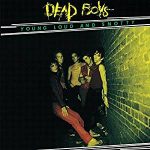
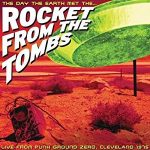
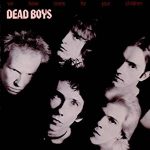
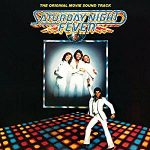
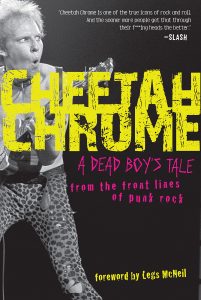
Discussion
No comments for “Interview: Cheetah Chrome”